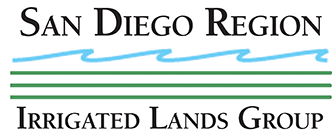
(760) 745 2215
General Waste Discharge Requirement (GWDR)
Questions & Answers
San Diego Region Irrigated Lands Group Administered by the San Diego County Farm Bureau
[ Download the Fact Sheet ]
Why is there an Ag Order?
The California Regional Water Quality Control Board, San Diego Region (San Diego Water Board) is responsible for making certain that state water runoff regulations for irrigated agriculture are implemented locally. For commercial agriculture this is done through the General Waste Discharge Requirement for Agriculture (Ag Order), adopted in 2016.
Does my farming operation require compliance?
Meeting any one of several tests requires Ag Order compliance:
Intent to make a profit (commercial sale of ag products).
Owner or operator files an IRS Form 1040 Schedule F Profit or Loss from Farming.
Owner or operator is required to have an Operator Identification Number for pesticide use reporting.
Operator receives agricultural water pricing (residential/ag meters may be exempt if there is no commercial production)
I consider myself a small farmer, can I be exempt?
The state law makes no provisions based on farm size. If your operation meets one of the tests, compliance is required.
My farm is certified organic. Do I still have to comply?
State runoff regulations do not contain compliance exemptions and the Ag Order applies to all farms that have irrigated crops, regardless of production technique.
I irrigate exclusively with well water. Does that require compliance?
The source of irrigation water is not a factor. Any type of irrigation, regardless of water source, triggers compliance.
What if there is no runoff from my farm?
The state clean water rules for agriculture make the assumption that even if there is no irrigation runoff from a farm there will be storm events when all properties experience runoff.
How do I know if I am within the compliance boundaries?
The Ag Order covers the San Mateo Watershed in southern Orange County, the Upper Santa Margarita Watershed in southern Riverside County, and all watersheds in San Diego County that drain to the Pacific Ocean.
Is there a deadline?
August 7, 2017 was the deadline to have all documents submitted to the San Diego Water Board. Any commercial agricultural operator who did not meet that deadline is currently subject to fines and possible enforcement actions by the San Diego Water Board.
How do I comply with the Ag Order?
The San Diego Water Board gives you the option of compliance through a third-party group or as an individual. The San Diego Regional Irrigated Lands Group (SDRILG) was formed as a third-party group so Farm Bureau members would have the easiest path to compliance.
What documents are required for the Ag Order?
Each participant must submit a Notice of Intent that gives details on the farming operation such as location, ownership, and crops grown. Also, a Water Quality Protection Plan will have to be prepared for each farm. SDRILG has developed online software to make the documentation easy for members. For those without internet access, Farm Bureau staff can complete the documents with a telephone interview or in-person meeting.
Why is Farm Bureau membership required?
SDRILG is affiliated with the Farm Bureau and was created to be a third-party group solely as a benefit for Farm Bureau members by offering an easy path to compliance for runoff regulations. It is not a reasonable expectation that a membership organization would provide services to non-members.
What if I would rather not be a Farm Bureau member?
Individual compliance is an option by establishing a direct regulatory relationship with the San Diego Water Board.
Why has San Diego been targeted by the regulators?
These regulations are not unique to San Diego. Farmers across the state and nation face similar, and often more onerous, runoff compliance regulations.
Do I have to pay any fees?
In addition to the annual Farm Bureau membership dues, the following fees apply:em>
SDRILG’s one-time enrollment fee of $300 per acre capped at $1500.
SDRILG’s annual acreage fee to cover administrative and water monitoring costs. For 2017-2018 that fee is $4.50 per acre in production plus a $60 administration fee.
$.87 per acre annual fee collected on behalf of the State of California. Â Â Â
$50 registration fee collected on behalf of the State of California.
$200 penalty fee collected on behalf of the State of California from all producers who receive an official “Directive” letter from the San Diego Water Board for failure to comply with the Ag Order.
Who is getting Directive letters?
The San Diego Water Board has GIS maps of the region that show which agricultural properties are in compliance. An effort has been launched by the San Diego Water Board to send Directive letters to several producers each week stating that compliance is required and failure to act can lead to substantial daily fines.